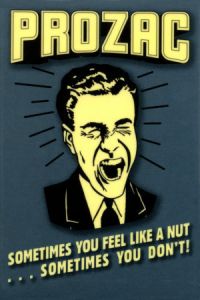New England Journal of Medicine: SSRI's Don't Really Work
 |
Today's Crikey.com.au reports about a study just completed and published in the New England Journal of Medicine. It's worth quoting the piece in full:
It’s official: the world has been fundamentally misled about the benefits and harms of extremely popular anti-depressant drugs, including Prozac, Zoloft and Aropax.
A study in this week’s New England Journal of Medicine found roughly one third of all the scientific trials of these antidepressants were never published. Why? Because the trial results did not show the drugs in a favourable light.
The study published this week examined data from the clinical trials of anti-depressants that drug companies had submitted to the United States Food and Drug Administration in recent decades.
They found that of 74 scientific trials of the anti-depressant medicines, 31% of them were never published in the medical literature. Some of the trials had positive, favourable results and some had negative, unfavourable results.
Almost all of the trials with positive results ended up being published in medical journals. Almost all of the trials with negative or questionable results were not published - or were published in a way that tried to portray the results in a positive light.
What this means is that doctors, patients and the public all over the world have been grossly mislead about the true value of these widely prescribed medicines. This is of course the class of anti-depressants that has been enthusiastically championed for more than a decade by psychiatrists closely tied to the drug makers, and widespread prescription of the drugs has cost the taxpayer hundreds of millions of dollars.
According to this week’s New England Journal of Medicine, if you look at what’s been published, 94% of the trials of these antidepressants that have been published were positive. But if you look at the real evidence, including the published and unpublished trials, as the authors of this week’s papers did, only 51% of the anti-depressant trials conducted were actually positive.
It's not clear exactly how negative trials were buried -- drug companies may have suppressed them, authors may not have submitted them, or journals may have decided not to publish them.
In recent years, concerns about buried trial data have led to the creation of new registers of all clinical trials, which the pharmaceutical industry is now actively involved in.
Given that I know several people who claim to have been "restored to themselves" because of healthy and regular doses of SSRIs, this report - like everything else in the world - needs to be taken with a dose of salts (preferrably lithium salts). Still, it should give everyone in the psychopharmocological community more than a moment's pause.
|

Recently @ DoseNation
|
|






















The comments posted here do not reflect the views of the owners of this site.